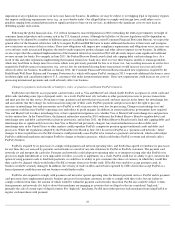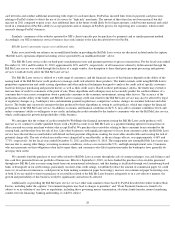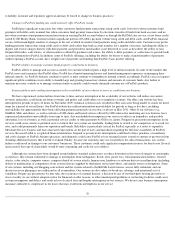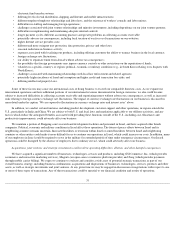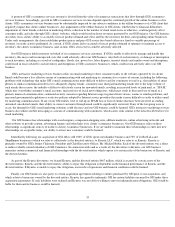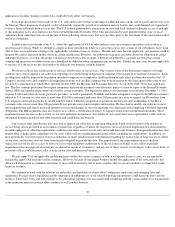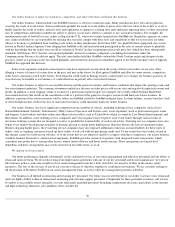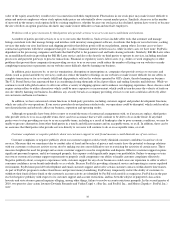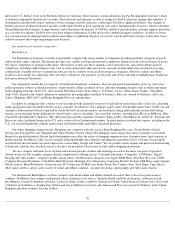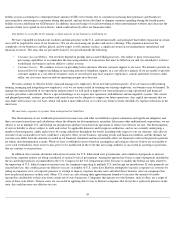eBay 2011 Annual Report Download - page 38
Download and view the complete annual report
Please find page 38 of the 2011 eBay annual report below. You can navigate through the pages in the report by either clicking on the pages listed below, or by using the keyword search tool below to find specific information within the annual report.
A portion of GSI's ecommerce services revenue is derived from the value of ecommerce transactions that flow through GSI's ecommerce
services business. Accordingly, growth in GSI's ecommerce services revenue depends upon the continued growth of the online businesses of its
clients. GSI's ecommerce services business may be substantially impacted by any adverse conditions in the offline businesses of a GSI client that
negatively impact that client's online businesses. Any impairment of the offline business of GSI clients, whether due to financial difficulties,
impairment of client brands, reduction in marketing efforts, reduction in the number of client retail stores or otherwise, could negatively affect
consumer traffic and sales through GSI's clients' websites, which would result in lower revenues generated by our GSI business. Our GSI business
also relies on its clients' ability to accurately forecast product demand and select and buy the inventory for their corresponding online businesses.
Under such arrangements, the client establishes product prices and pays GSI service fees based either on a fixed or variable percentage of
revenues, or on the activity performed. As a result, if GSI's clients fail to accurately forecast product demand or optimize or maintain access to
inventory, the client's ecommerce business (and, in turn, GSI's service fees) could be adversely affected.
Our GSI business holds inventory on behalf of its ecommerce services customers. If GSI is unable to effectively manage and handle this
inventory, this may result in unexpected costs that could adversely affect our GSI business. Any theft of such inventory, or damage or interruption
to such inventory, including as a result of earthquakes, floods, fire, power loss, labor disputes, terrorist attacks and similar events and disruptions,
could result in losses related to such inventory and disruptions to GSI's customers' businesses, which could in turn adversely affect our GSI
business.
GSI's interactive marketing services business relies on email marketing to drive consumer traffic to the websites operated by its clients.
Email could become a less effective means of communicating with and marketing to consumers for a variety of reasons, including the following:
problems with technology that make GSI's email communications more difficult to deliver and for consumers to read (e.g., the inability of smart
phones or similar communication devices to adequately display email); consumers may disregard marketing emails due to the large volume of
such emails they receive; the inability of filters to effectively screen for unwanted emails, resulting in increased levels of junk mail, or “SPAM,”
which may overwhelm consumer's email accounts; increased use of social networking sites, which may result in decreased use of email as a
primary means of communication; continued security concerns regarding Internet usage in general from viruses, worms or similar problems; and
increased governmental regulation or restrictive policies adopted by Internet service providers that make it more difficult or costly to utilize email
for marketing communications. If any of our GSI entities were to end up on SPAM lists or lists of entities that have been involved in sending
unwanted, unsolicited emails, their ability to contact customers through email could be significantly restricted. If any of the foregoing were to
occur, the demand for GSI's email marketing solutions could decrease and our GSI business could be harmed. GSI's interactive marketing services
business also utilizes mobile messaging as a means of communicating with consumers, which carries risks similar to the risks described above for
email marketing.
Our GSI business has relationships with search engines, comparison shopping sites, affiliate marketers, online advertising networks and
other websites to provide content, advertising banners and other links to its clients' ecommerce businesses. Our GSI business relies on these
relationships as significant sources of traffic to clients' ecommerce businesses. If we are unable to maintain these relationships or enter into new
relationships on acceptable terms, our ability to attract new customers could be harmed.
Immediately following our acquisition of GSI, eBay sold 100% of GSI's sports merchandise business and 70% of its RueLaLa and
ShopRunner businesses (which we refer to collectively as the divested entities), to Kynetic LLC, which we refer to as Kynetic. Kynetic is
primarily owned by GSI's former Chairman, President and Chief Executive Officer, Mr. Michael Rubin. Each of the divested entities was a direct
or indirect wholly-owned subsidiary of GSI Commerce. In connection with (and as a result of) the divestiture to Kynetic, our GSI business
maintains certain commercial and financial relationships with the divested entities which expose it to certain risks of the businesses of Kynetic and
the divested entities.
As part of the Kynetic divestiture, we loaned Kynetic and the divested entities $467 million, which is secured by certain assets of the
divested entities. Kynetic and the divested entities' ability to repay this obligation is dependent on the financial performance of Kynetic and the
divested entities. If Kynetic is unable to repay this obligation, our results of operations and financial condition could be harmed.
Finally, our GSI business is also party to certain acquisition agreements relating to entities purchased by GSI prior to our acquisition, and
which relate to businesses owned by the divested entities. Kynetic has agreed to indemnify GSI for certain liabilities incurred by GSI under these
acquisition agreements. If such liabilities were realized and Kynetic was not able or willing to meet its indemnification obligations, GSI would be
liable for them and its business could be harmed.
33






